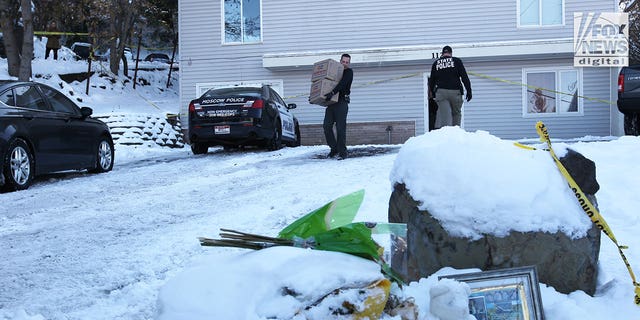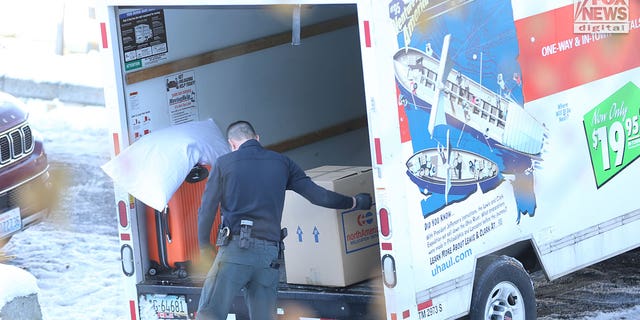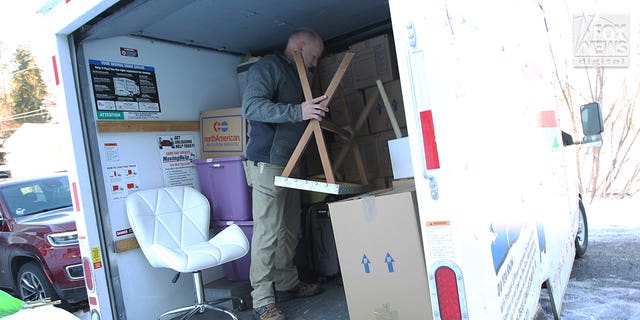Idaho murders: Forensics expert questions ‘urgency’ in removing victims’ personal belongings from crime scene
MOSCOW, Idaho — Just hours after Moscow, Idaho, police personnel removed some of the victims’ personal belongings from the crime scene, law enforcement and forensics experts began weighing in about the decision to do so, with some warning there’s no turning back.
“I worked as a death investigator for a long, long time. It’s important for families to have something to hold on to – they need those things,” said longtime forensics expert Joseph Scott Morgan. “But, you don’t want to do anything that is going to be to the detriment of the case. Because you cannot predict what is going to happen months from now, a year from now, when this person is caught and they go to trial.”
On Wednesday, Moscow Police Chief James Fry and other law enforcement officers packed some, but not all, of the victims’ belongings from inside the crime scene at 1122 King Road.
More than three weeks ago, on Nov. 13, University of Idaho students Ethan Chapin, Xana Kernodle, both 20, and Kaylee Goncalves and Madison Mogen, both 21, were discovered fatally stabbed on the second and third floors of the home.
UNIVERSITY OF IDAHO STUDENTS KILLED: A TIMELINE OF EVENTS
The case remains unsolved, and the murder weapon has not been recovered, police have said.
Officials previously noted that the items that were removed from the crime scene “are no longer needed for the investigation,” and would be taken to a secure location for the family to collect.
IDAHO POLICE SEARCH FOR WHITE HYUNDAI ELANTRA IN MOSCOW COLLEGE MURDER CASE
Morgan, one of the nation’s foremost forensics investigators, told Fox News Digital on Thursday he felt police had released the items from the crime scene too soon.
Speaking generally, Morgan explained that an offender who is using a knife to assault or kill someone, he or she will leave remnants of “cast off” while carrying out the stabbing motions.
“As they withdraw [the knife], droplets of blood travel through the air,” he explained. “Now, sometimes these droplets can’t be fully appreciated. You can’t see them necessarily. And that droplet may deposit itself on just some kind of arbitrary item in a room.”
But once the item has been removed from the spot where it sat during the course of the crime, he said, “you can never go back and place that item in its original orientation.”
“You lose all context,” Morgan went on. “You can’t go back and say, ‘Well, we missed this. We’re going to place it back here.’”
The distinguished scholar of applied forensics at Jacksonville State University called the decision to remove some of the victims’ belongings, “a big thing. That’s why this is so significant for me as a forensics person.”
IDAHO POLICE PACK UP MOSCOW MURDER VICTIMS’ BELONGINGS AT CRIME SCENE

When asked, he said he felt the step of removing some of the items was taken too soon, and explained: “I think the bigger question here is, what was the urgency?”
“Items that the family would like to have, how does that trump practical necessary?” he went on. “What’s it going to hurt to lock this thing down for a longer time just to make sure everything has been considered.”
Former FBI special agent Jonathan Gilliam expressed similar concerns regarding the decision, and added that “from an evidentiary standpoint, the crime scene had been altered. And that’s a problem.”
“Crime scenes hold onto evidence,” he explained. “And sometimes you don’t realize in a case like that until you find a subject … Now, that crime scene has been tainted because they have removed things. And it was tainted already because people had been in there and quite possibly removed things because they didn’t want to get in trouble.”
MOSCOW, IDAHO CHIEF OF POLICE JIM FRY ON POLICE BOXING UP THE BELONGINGS OF MURDER VICTIMS
Gilliam, also a former U.S. Navy SEAL, noted that a case “does not just involve investigations. It also involves prosecution.”
“If you have … a crime that has not been solved, and you have a crime scene that was that filled with evidence and was also altered by other people, I would think you would want to keep that crime scene as long as possible,” he said. “Because when you do find a subject, there may be a reason why you have to go back and look for something else.”
Removing items from a crime scene typically signals “the end of the process,” said John Jay College of Criminal Justice professor Joseph Giacalone.

“If they’re removing personal items now and all that other kind of stuff, they’re done processing the scene,” he told Fox News Digital. “They’ve gotten whatever they think they could have gotten and they’ll just wait for test results back on a variety of things because at this point there’s no going back.”
Chief Fry spoke to reporters outside the home on Wednesday, and said he and other personnel had taken “some of the things the family wanted and other belongings that were there.”
“We owe this to the families. We owe this to the victims,” he said. “We owe this to our community.”

Chapin, Goncalves, Kernodle and Mogen were discovered fatally stabbed inside the three-story home at 1122 King Street just before noon on Nov. 13.
The home is located just one block from the University of Idaho campus and within eyeshot of some of the fraternity houses.

Officials have said they believe the victims were asleep when they were attacked between 3 and 4 a.m. Each victim suffered several stab wounds, and some showed signs of trying to defend themselves.
Two other roommates were on the bottom floor of the home and survived, police said.

The Moscow Police Department is urging the public to submit any images or information that they think could be important or useful to their investigation. They can do so by calling 208-883-7180, submitting tips through tipline@ci.moscow.id.us and sending digital media here.
Authorities have also created a dedicated webpage related to the King Road attack.
Fox News Digital’s Rebecca Rosenberg contributed to this report.
Read the full article Here


